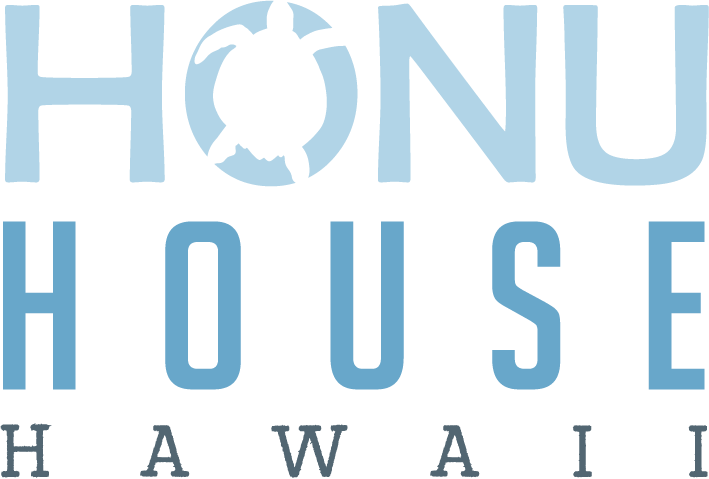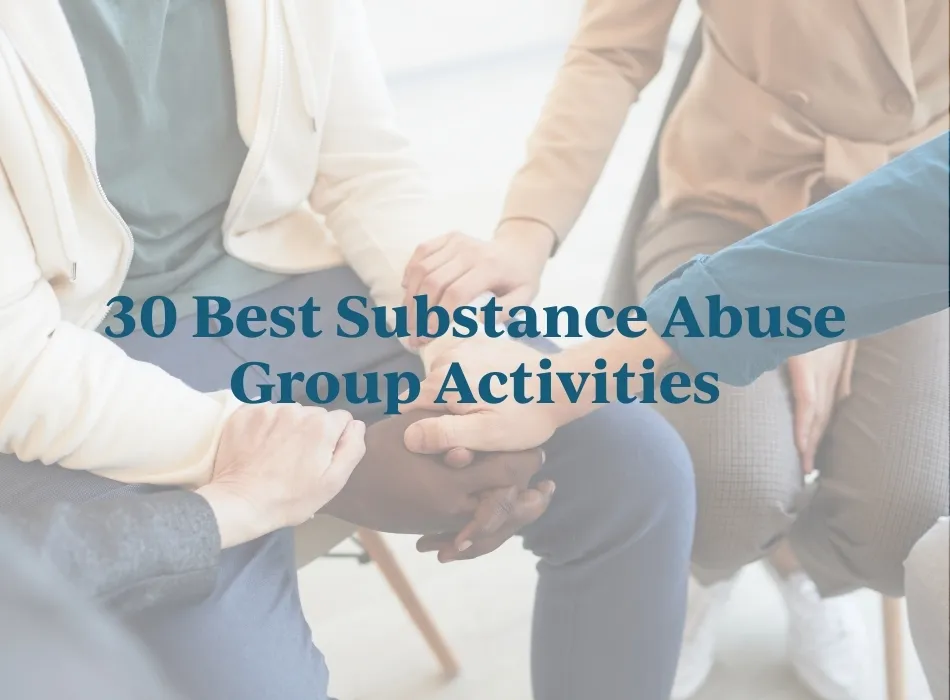
30 Best Substance Abuse Group Activities
-
By John Burke
-
February 1, 2024
Many people recovering from substance abuse disorder often feel lost, alone, and misunderstood. While individual therapy sessions with a substance abuse therapist can minimize these feelings, there’s another powerful intervention that can significantly enhance the road to recovery: addiction group activities.
Participating in group activities within a substance abuse treatment center offers a safe space for individuals to connect with others who share similar experiences, challenges, and aspirations. This sense of belonging and shared understanding can be transformative, fostering feelings of support, reducing isolation, and offering invaluable insights along the path to recovery.
Whether you’re considering joining a substance abuse treatment center in Hawaii, supporting a loved one in their recovery journey, or just want to learn more about the power of group therapy, read on to explore the various types of substance abuse group activities available in treatment centers, their benefits, and how they can play an instrumental role in the recovery process.
Benefits of Substance Abuse Group Activities
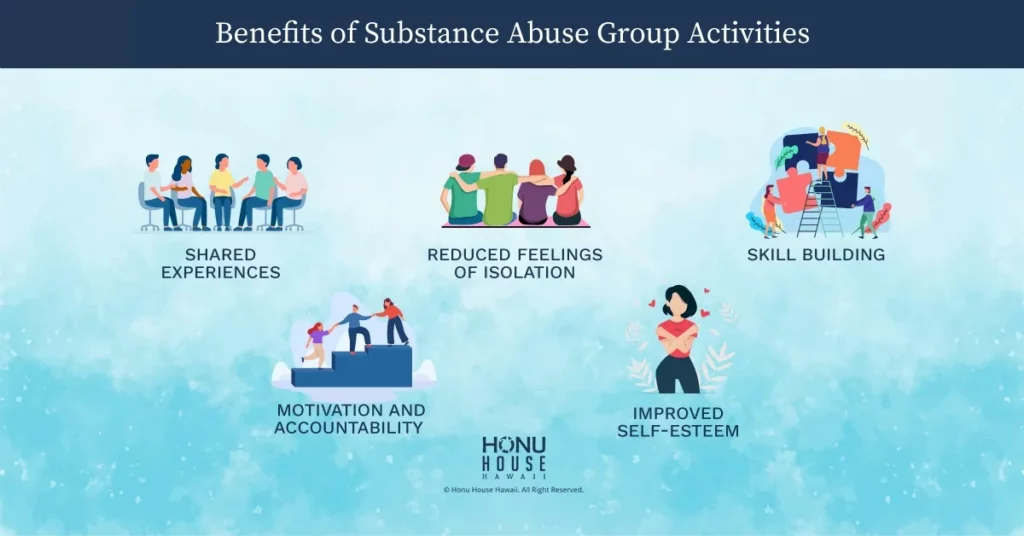
Group therapy can feel daunting, especially for individuals hesitant to divulge intimate details about their experience with substance abuse disorder to a group of strangers. However, while being vulnerable to unfamiliar people can be uncomfortable, group therapy can offer many benefits individual therapy sessions don’t provide. In fact, according to a study published in The American Journal of Psychotherapy, group therapy was found to reduce the symptoms associated with multiple psychological conditions, including substance use disorders.
That said, some of these benefits of substance abuse group activities include:
Shared Experiences
People recovering from substance abuse disorder often feel misunderstood by others. Group activities provide a platform for individuals to share their experiences with others who have walked similar paths. This shared understanding encourages individuals to open up about their challenges and reminds them they aren’t alone on the path to recovery.
Reduced Feelings of Isolation
Recovery often feels like a solitary journey. Many people recovering from substance abuse addiction usually mask their struggles because of the stigma associated with addiction. Group activities offer a safe haven where individuals can freely discuss their experiences without judgment.
By sharing their stories and listening to others, individuals realize addiction isn’t a character flaw but a complex condition that they can overcome with support and community. This open dialogue minimizes feelings of shame and isolation, paving the way for self-acceptance and healing.
Skill Building
Group therapy doesn’t just provide a platform for individuals to meet with others with shared experiences. It also offers them the opportunity to build skills to combat triggers, resist cravings, and maintain sobriety.
Through group activities for substance abuse, like group discussions, role-playing activities, and interactive games, individuals can develop effective coping mechanisms like mindfulness, journaling, and exercising. These skill-building activities can enable individuals to develop healthy habits, minimizing the risk of relapse.
Motivation and Accountability
Individuals face many temptations on the road to recovery. Group activities offer a great source of motivation and accountability. Participants set and track progress on their goals, creating a shared commitment to sobriety. This group effort encourages individuals to focus on their goals and persist through difficult moments.
Improved Self-Esteem
Addiction can damage self-esteem and confidence, leaving individuals feeling worthless. Group activities provide a forum for building self-esteem and confidence. Through positive interactions, constructive feedback, and shared triumphs, individuals may begin to recognize their strengths, boosting their self-worth. This enhanced confidence can promote recovery, reducing the risk of relapse.
Cost-efficiency
Group therapy typically costs less than individual therapy. Since fewer professionals are required to treat multiple patients, the cost drops. This opens doors for more people to access therapy, as insurance plans often cover group therapy.
Top 30 Substance Abuse Group Activities
Opening up and sharing personal experiences with strangers can be daunting, especially for individuals recovering from substance abuse. That’s why, it’s advisable to start with easy substance abuse group activities to build comfort and trust within the group while gradually progressing to more challenging activities.
That said, here are 30 substance abuse group activities classified based on their difficulty levels: easy, intermediate, and hard.
Easy Activities
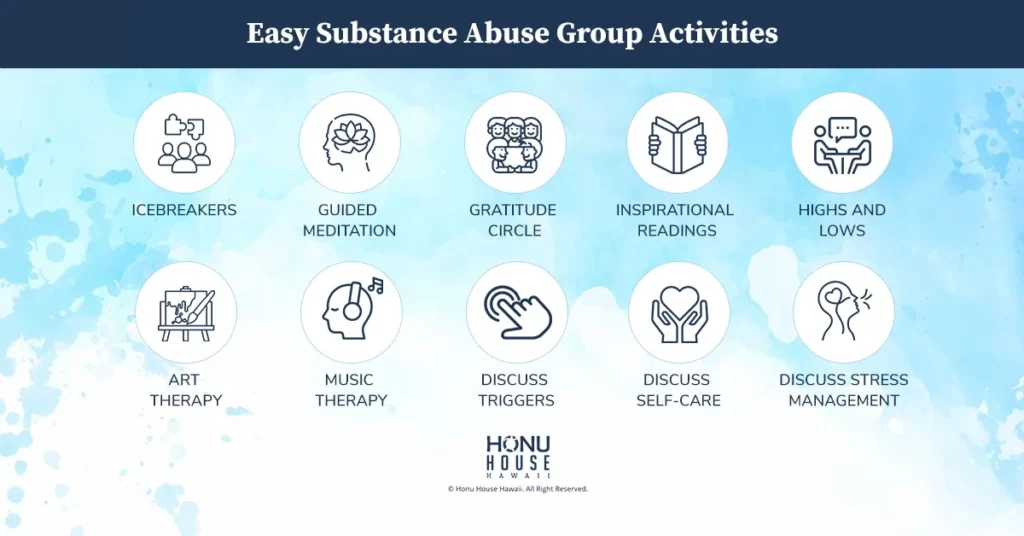
Icebreakers
Simple icebreakers for substance abuse groups can foster a sense of community and ease participants into sharing. Some great fun recovery games for groups include:
a) Two truths and a lie: Share three statements — two true and one false and let others guess the lie. Simple and engaging, this game breaks the ice without demanding vulnerability.
b) Would you rather: Ask lighthearted hypothetical questions to ignite stimulating conversations. For example, ”Would you rather have the ability to run as fast as a cheetah or swim as fast as a sailfish?”
c) Three C’s: Allow participants to name a car, cartoon character, color, and cuisine that best describes their character and explain their choices.
Guided Meditation
A guided meditation session at the start of a substance abuse group activity session can create a calming atmosphere for participants.
Gratitude Circle
Expressing gratitude can create a paradigm shift, helping participants focus on positive rather than negative thoughts. Ask participants to form a circle, hold hands, and share five things they’re grateful for.
Inspirational Readings
Bring a quote or short passage related to recovery and discuss its meaning with the participants in the group.
Highs and Lows
Ask participants to share a high and low from their week to build trust without oversharing.
Art Therapy
Some participants may struggle to express themselves using words. For these participants, art therapy with simple prompts can effectively convey how they feel.
Music Therapy
Many people find solace in music, making music therapy an effective substance abuse group activity. Ask each participant to pick a song they enjoy. Then, ask each participant to discuss why the song resonates with them.
Discuss Triggers
Triggers are people, places, and thoughts that make people battling with substance abuse have a strong urge to use drugs. They are a common cause of relapse, so it’s vital to deal with them. Ask participants to talk about their triggers and coping mechanisms they found useful.
Discuss Self-Care
Self-care is pivotal to recovery. Ask participants to take turns listing effective self-care practices they’ve found helpful, like eating a balanced diet, getting adequate sleep, and exercising regularly.
Discuss Stress Management
Stress is a common cause of relapse. Ask participants to list stressors and how they handle them. Doing so can help participants learn healthy coping mechanisms.
Intermediate Activities
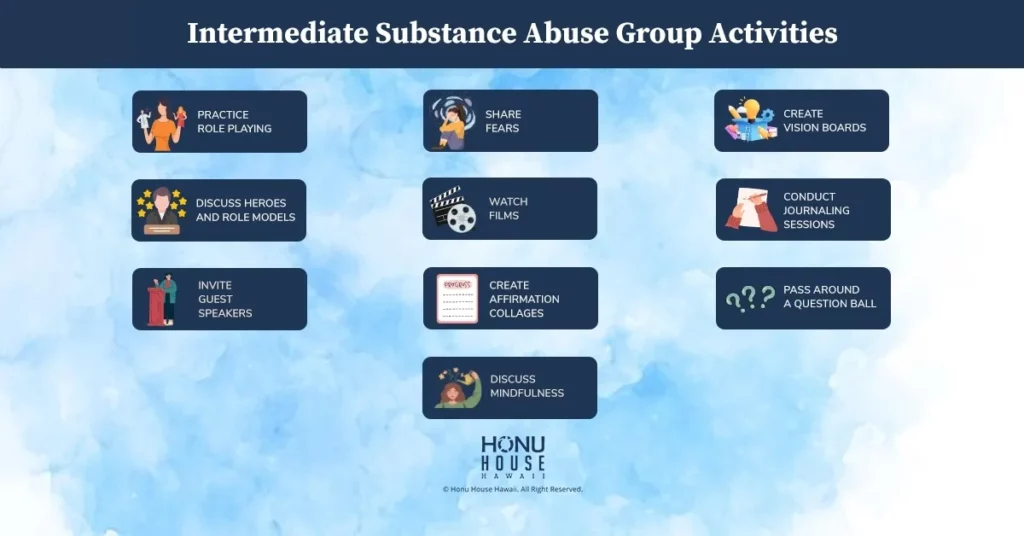
Practice Role Playing
Individuals on the path to recovery often have to make tough choices. For example, they may have to seek forgiveness from people they have hurt or sever ties with friends who abuse drugs. Ask participants to enact these real-life situations to help them deal with conflict.
Share Fears
Many individuals in recovery usually harbor similar fears. To encourage participants to share their fears, ask them to write them down on a piece of paper and pass around a hat or bowl where they can slip the paper. Then, read out the fears and allow members to identify shared fears. Doing so can make participants realize they aren’t alone in their struggles.
Create Vision Boards
Ask participants to create visual boards showcasing their recovery goals and aspirations to ignite stimulating conversations and reflection.
Discuss Heroes and Role Models
Heroes and role models can serve as a shining example for people on the path to recovery. Ask participants to talk about people who have had a positive impact on their lives that they wish to emulate.
Watch Films
Watch films or documentaries about substance abuse and discuss them with participants after the viewing.
Conduct Journaling Sessions
Journaling is an excellent way to cope with substance abuse disorder. Introduce structured journaling sessions and allow participants to share what they’ve written if they’re comfortable sharing.
Invite Guest Speakers
Invite individuals with successful recovery stories to share their insights with the group. Alternatively, invite experts to speak about topics like the neuroscience of addiction.
Create Affirmation Collages
Affirmations are concise, powerful statements that can promote positive thinking and boost self-esteem. Popular examples include, ”I am getting better,” I am not alone,” and ”I am destined for great things.”
Ask group members to write down positive self-affirmation statements on pieces of paper, cut them into strips, and glue them onto poster boards. These affirmation collages can act as a source of hope and strength for group members in recovery.
Pass Around a Question Ball
Getting individuals in recovery to talk about their experiences can be challenging. To spark lively discussions, pass around a question ball. A question ball is a ball with recovery-related questions, like ”What milestones in your recovery journey are you especially proud of?” or How do you manage stress?”
To play the game, ask group members to pass the ball amongst each other and answer whichever question their right thumb lands on.
Discuss Mindfulness
Explore the concept of mindfulness and discuss why it’s important to live in the present moment.
Hard Activities
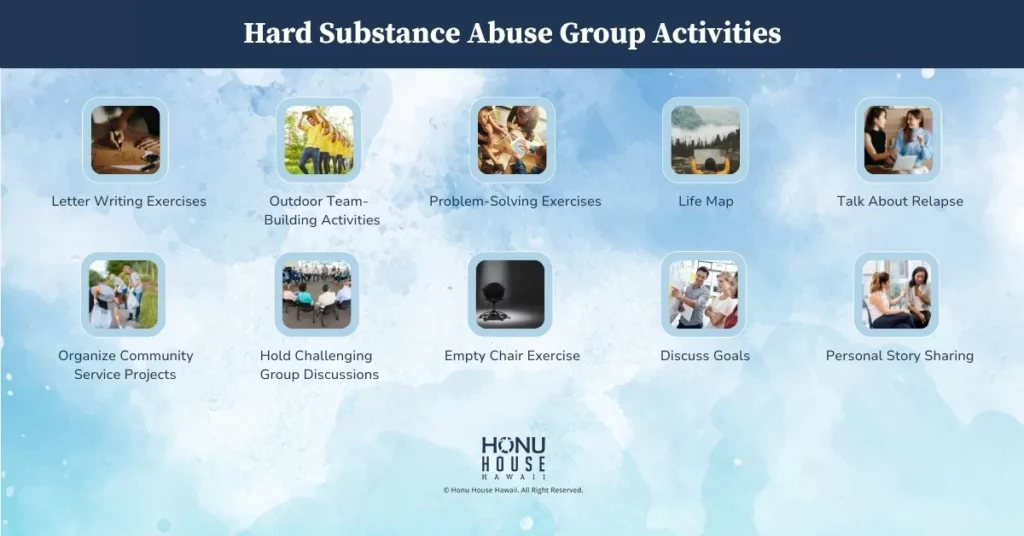
Letter Writing Exercises
Ask group members to write a letter to their younger self and ask them to share the letter with the group if they’re comfortable. This can spark discussions about self-forgiveness.
Outdoor Team-Building Activities
Organize excursions to promote teamwork, communication, and trust.
Problem-Solving Exercises
Organize problem-solving activities to encourage group members to cooperate and stimulate critical thinking.
Life Map
Ask participants to create a visual representation of their life journey and share it with the group.
Talk About Relapse
Up to 60% of people with substance use disorder relapse after treatment. Explore the consequences of relapse after treatment. This could include severed relationships, health issues, or financial issues.
Organize Community Service Projects
Get group members to participate in community service projects like distributing food to homeless shelters, planting trees, or cleaning up parks to instill a sense of purpose and achievement.
Hold Challenging Group Discussions
Hold group discussions to discuss complex issues related to addiction, like forgiveness, anger management, and depression.
Empty Chair Exercise
Ask each group member to address an imaginary person representing the addiction to pour out their emotions and practice assertive communication.
Discuss Goals
Discuss goal setting and ask each group member what they wish to accomplish upon completing the substance abuse recovery program.
Personal Story Sharing
Finally, once participants become comfortable within the group and make significant progress on the road to recovery, allow them to share the more intimate aspects of their journey, like their struggles and how they overcame them, to promote peer support.
Conclusion
Substance abuse group activities offer various benefits for people on the path to recovery. At Honu House, we take a comprehensive approach to substance abuse treatment, including incorporating a variety of addiction group activities.
Want to enroll in group therapy or sign up a loved one for substance abuse counseling? Contact us today to learn more about our substance abuse interventions.
FAQs
Are Group Activities Mandatory in Recovery Programs?
While many treatment centers encourage participation in group activities because of their immense benefits, participation is optional.
Are Substance Abuse Group Activities Suitable for Everyone?
Yes, addiction recovery activities are adaptable to different recovery stages. From the early stages to the latter ones individuals can start group activities at any stage of the recovery journey.
How Do Group Activities Address the Fear of Sharing Personal Experiences?
Addiction treatment centers address the fear of sharing personal experiences by easing participants in gradually, starting with simple icebreakers and slowly progressing to more intimate conversations.
What Role Do Harder Activities Play in Group Therapy?
Harder activities like sharing personal stories and having challenging discussions encourage introspection. They also challenge participants to overcome insurmountable challenges and forge deep connections with others.
Can Group Activities Replace Individual Therapy in Substance Abuse Recovery?
Group activities complement individual therapy. While individual therapy sessions focus on personal issues, group activities can provide invaluable insights into the perspectives of others.
